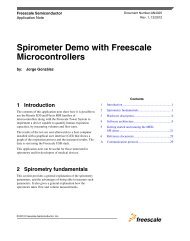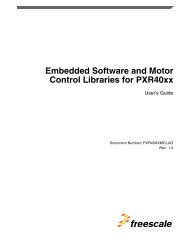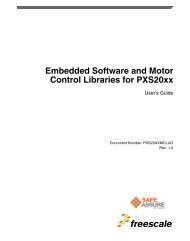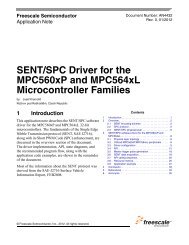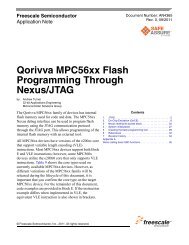Design Checklist for PowerQUICC II Pro MPC8309 Processor
Design Checklist for PowerQUICC II Pro MPC8309 Processor
Design Checklist for PowerQUICC II Pro MPC8309 Processor
You also want an ePaper? Increase the reach of your titles
YUMPU automatically turns print PDFs into web optimized ePapers that Google loves.
Clocking<br />
The primary clock source <strong>for</strong> <strong>MPC8309</strong> can be one of three inputs, Crystal (SYS_XTAL_IN),<br />
SYS_CLK_IN and PCI_SYNC_IN. The clock <strong>for</strong> QUICC Engine is derived from QE_CLK_IN. Table 3<br />
lists the clock signal pins.<br />
Signal Pin Type<br />
Table 3. Clock Signal Pin Listing<br />
Connection<br />
If Used If Not Used<br />
PCI_CLK[0:2] O As needed Open,<br />
Should use<br />
OCCR to<br />
disable the<br />
output clock<br />
PCI_SYNC_IN I Connect to PCI_SYNC_OUT<br />
or 25–66 MHz clock signals<br />
Not<br />
applicable.<br />
This pin<br />
should<br />
always be<br />
connected<br />
PCI_SYNC_OUT O Connect to PCI_SYNC_IN Open,<br />
Should use<br />
OCCR to<br />
disable the<br />
output clock<br />
SYS_CLK_IN/<br />
SYS_XTAL_IN<br />
and<br />
SYS_XTAL_OUT<br />
I Connect to 24–66.67 MHz<br />
clock signal<br />
QE_CLK_IN I Connect to 24–66.67 MHz<br />
clock signal<br />
1 - 4.7k� to<br />
GND<br />
1.5 k� to<br />
GND<br />
4.1 System Clock in PCI Host Mode<br />
When the <strong>MPC8309</strong> is configured as a PCI host device (RCWH[PCIHOST] = 1), SYS_CLK_IN is its<br />
primary input clock. SYS_CLK_IN feeds the PCI clock divider (÷2), the PCI_SYNC_OUT and PCI_CLK<br />
multiplexers. PCI_SYNC_OUT is connected externally to PCI_SYNC_IN to allow the internal PCI<br />
controller clock to synchronize with the external PCI agent clocks. PCI_SYNC_OUT must be connected<br />
properly to PCI_SYNC_IN, with equal delay to all PCI agent devices in the system.<br />
<strong>Design</strong> <strong>Checklist</strong> <strong>for</strong> <strong>PowerQUICC</strong> <strong>II</strong> <strong>Pro</strong> <strong>MPC8309</strong> <strong>Pro</strong>cessor, Rev. 1<br />
8 Freescale Semiconductor<br />
Notes<br />
• Device as PCI host: Functions as PCI output<br />
clock banks. OCCR register determines<br />
whether clocks are set as SYS_CLK_IN or<br />
SYS_CLK_IN÷2.<br />
Device as PCI agent: These signals are not<br />
used.<br />
Device as PCI host: Functions as<br />
PCI_SYNC_IN. Connect externally to<br />
PCI_SYNC_OUT.<br />
Device as PCI agent: A valid 25–66.67 MHz<br />
clock signal (at OV DD level) must be applied to<br />
this signal.<br />
Device as PCI host: Connect externally to<br />
PCI_SYNC_IN signal <strong>for</strong> de-skewing of external<br />
PCI clock routing. Loop trace should match with<br />
PCI_CLKx signal traces.<br />
Device as PCI agent: This signal is not used.<br />
Clock input. A valid 25–66.67 MHz clock signal (at<br />
OV DD level) must be applied to this input. When an<br />
oscillator is used to feed SYS_CLK_IN, tie the<br />
SYS_XTAL_IN pin to GND and leave<br />
SYS_XTAL_OUT unconnected. When Crystal is<br />
connected across SYS_XTAL_IN and<br />
SYS_XTAL_OUT, tie SYS_CLK_IN to GND.<br />
QE Clock input. A valid 25–66.67 MHz clock signal<br />
(at OV DD level) must be applied to this input when<br />
used.






